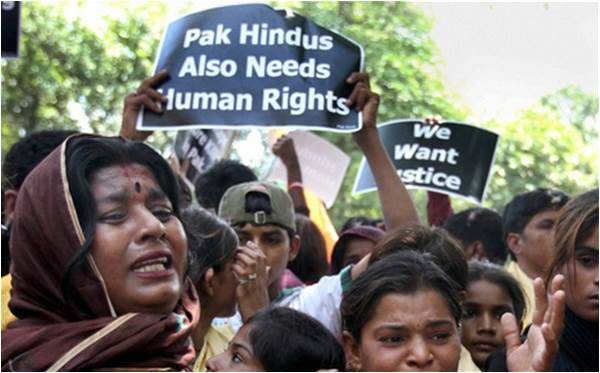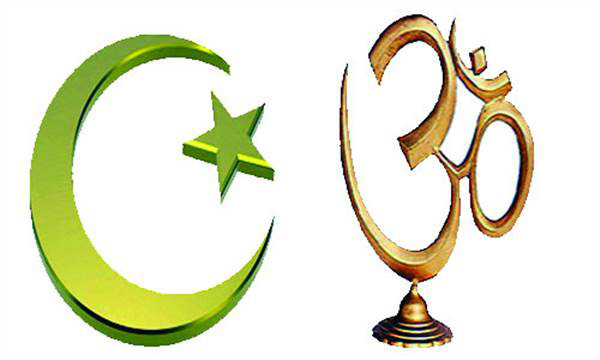
There are over 35,000 Hindus living in Larkana, making up around nine percent of the city’s population. And so when the ever-ready Muslim mob conjured the blasphemy card, in turn torching a temple and a dharamshala in the city on March 16, the religious tension in the city was as palpable as it gets. The reverberations of said tension were felt in Osta Muhammad and Dera Murad Jamali as well, as the Pakistani Muslim’s ancestral animosity towards Hindus, coupled with a baseless allegation of Holy Quran’s desecration, spilt bigotry all over the country.
It is very important for Pakistani Muslims (97 percent of the population) to differentiate themselves from Hindus. After all it’s precisely this difference that became our state’s raison d’etre in 1947. And differentiating is the first step en route to the development of hatred that eventually inflates into bigotry.
For the average Pakistani Muslim this bigotry wards off the increasingly looming identity crisis, and reaffirms the illusions of historical and religious grandeur.
[quote]Mehmood Ghaznavi was Shia-phobic [/quote]
The destruction of the Somnath Temple in 1,025 AD by Mahmud Ghaznavi is one of the “proudest” moments in the “history of Pakistan” that ostensibly began when the first Muslim (Muhammad bin Qasim) entered the region in the 8th century. During his endeavour to destroy the temple, Ghaznavi also butchered 50,000 Hindus – about the same number of people that the Pakistani Taliban have obliterated in over a decade with significantly deadlier arsenal. Such is the status of destroying a Hindu temple in defining the ideology of Pakistan that the fact that Ghaznavi invaded Multan in 1,005 AD to ruthlessly massacre Ismaili Shias is conveniently forgotten.
Ghaznavi was Shia-phobic, a murderer and plunderer; however, his massacre of Hindus and destruction of temples elevates his status to a ‘national’ hero even though he had died 900 years before the idea of this nation was conceived. It goes without saying that had Ghaznavi been alive he would have been very proud of the mob that destroyed the Hindu temple in Larkana.
An excerpt from Tipu Sultan’s – another hero and role model for Pakistanis – letter to Bekal’s governor, Budruz Zuman Khan in 1790 tells us more about him than the thousands of Hindu massacres that he orchestrated and the multiple coerced conversions that he oversaw;
“Don’t you know I have achieved a great victory recently in Malabar and over four lakh Hindus were converted to Islam? I am determined to march against that cursed Raman Nair (Rajah of Travancore) very soon. Since I am overjoyed at the prospect of converting him and his subjects to Islam, I have happily abandoned the idea of going back to Srirangapatanam now.”
From Ziauddin Barani’s Fatwa-i-Jahandari calling for “an all-out struggle against Hinduism” under Muhammad bin Tughlaq to Muhammad Ali Jinnah dubbing Pakistan’s establishment “essential to prevent Hindu imperialism spreading into the Middle East” in the lead up to August 1947, Muslim rulers and leaders in the Indian subcontinent often established antagonism against the Hindus as an integral part of their governance and policy making.
The bile against Hinduism that Pakistani school curricula spew has been well documented and condemned by liberal quarters. “The foundation of Hindu set-up was based on injustice and cruelty” (Grade 6, Social Studies Book); this is one of the many gems from the books that our children are taught to further proliferate xenophobia inside their already jingoistic heads. However, the significance of hating Hindus for Pakistanis is a lot more than just biased historical narratives or pumping up bigotry under the garb of patriotism.
[quote]It is not being implied that Hindus do not – or have never – reciprocated these sentiments[/quote]
It is very important to realise here that it's not being implied that Hindus do not – or have never – reciprocated these sentiments. The stereotypical Hindu of ‘secular’ India manifests similar communal antagonism. And the nation might very well be on the verge of electing a communalist as their next prime minister in the shape of Narendra Modi. However, what needs to be understood and underscored here is that an Indian Hindu manifesting communal bigotry contradicts the ‘idea’ of India, while a Pakistani Muslim by doing so conforms to the ‘idea’ of Pakistan. Opposition to Hindus, and antagonism between Hindus and Muslims, form the founding principle of Pakistan.
Ideally the Islamo-fascist clamours of the 1940s, that became patriotic anthems of the movement for Pakistan, should have no relevance to events in modern day Pakistan. But how can you expect Hindu-Muslim harmony in a state that was created through fanning the embers of Hindu-Muslim disharmony? How can Pakistan expect the Hindus and Muslims inhabiting the country to evolve into one nation, after creating a state that owes itself to the principle that Hindus and Muslims of the Indian subcontinent are two different nations and cannot survive in unison?
The rather popular “Arabisation” of and obsession with our Islamic identity is the direct corollary of the Pakistan movement, since the Muslim inhabitants of this region were told that they had nothing in common with the Hindus of the region. This has obviously resulted in Pakistanis considering their country as a quasi-Arab land.
Refusing to acknowledge the commonalities between Hindus and Muslims of the Indian subcontinent is a part of the legacy of our founding fathers, and the reason why Pakistan was created in the first place. We might castigate the Pakistan Studies curricula all we want, but if anti-Hindu material is taken out of these books, the curriculum designers and the narrators of Pakistan’s version of Indo-Pak history would find it really hard to justify the creation of Pakistan.
Jinnah might have told the Pakistani Hindus on August 11, 1947 that they are “free to go to their temples,” but as long as his separatist movement and the cult of Ghazvani and Tipu Sultan is extolled, the Pakistani Muslims would continue to feel equally “free” to torch these temples.
For Pakistan to achieve religious harmony and existential stability it would inevitably have to question its founding ideology. That’s the paradox staring the country in the face right now.
It is very important for Pakistani Muslims (97 percent of the population) to differentiate themselves from Hindus. After all it’s precisely this difference that became our state’s raison d’etre in 1947. And differentiating is the first step en route to the development of hatred that eventually inflates into bigotry.
For the average Pakistani Muslim this bigotry wards off the increasingly looming identity crisis, and reaffirms the illusions of historical and religious grandeur.
[quote]Mehmood Ghaznavi was Shia-phobic [/quote]
The destruction of the Somnath Temple in 1,025 AD by Mahmud Ghaznavi is one of the “proudest” moments in the “history of Pakistan” that ostensibly began when the first Muslim (Muhammad bin Qasim) entered the region in the 8th century. During his endeavour to destroy the temple, Ghaznavi also butchered 50,000 Hindus – about the same number of people that the Pakistani Taliban have obliterated in over a decade with significantly deadlier arsenal. Such is the status of destroying a Hindu temple in defining the ideology of Pakistan that the fact that Ghaznavi invaded Multan in 1,005 AD to ruthlessly massacre Ismaili Shias is conveniently forgotten.
Ghaznavi was Shia-phobic, a murderer and plunderer; however, his massacre of Hindus and destruction of temples elevates his status to a ‘national’ hero even though he had died 900 years before the idea of this nation was conceived. It goes without saying that had Ghaznavi been alive he would have been very proud of the mob that destroyed the Hindu temple in Larkana.
An excerpt from Tipu Sultan’s – another hero and role model for Pakistanis – letter to Bekal’s governor, Budruz Zuman Khan in 1790 tells us more about him than the thousands of Hindu massacres that he orchestrated and the multiple coerced conversions that he oversaw;
“Don’t you know I have achieved a great victory recently in Malabar and over four lakh Hindus were converted to Islam? I am determined to march against that cursed Raman Nair (Rajah of Travancore) very soon. Since I am overjoyed at the prospect of converting him and his subjects to Islam, I have happily abandoned the idea of going back to Srirangapatanam now.”
From Ziauddin Barani’s Fatwa-i-Jahandari calling for “an all-out struggle against Hinduism” under Muhammad bin Tughlaq to Muhammad Ali Jinnah dubbing Pakistan’s establishment “essential to prevent Hindu imperialism spreading into the Middle East” in the lead up to August 1947, Muslim rulers and leaders in the Indian subcontinent often established antagonism against the Hindus as an integral part of their governance and policy making.
The bile against Hinduism that Pakistani school curricula spew has been well documented and condemned by liberal quarters. “The foundation of Hindu set-up was based on injustice and cruelty” (Grade 6, Social Studies Book); this is one of the many gems from the books that our children are taught to further proliferate xenophobia inside their already jingoistic heads. However, the significance of hating Hindus for Pakistanis is a lot more than just biased historical narratives or pumping up bigotry under the garb of patriotism.
[quote]It is not being implied that Hindus do not – or have never – reciprocated these sentiments[/quote]
It is very important to realise here that it's not being implied that Hindus do not – or have never – reciprocated these sentiments. The stereotypical Hindu of ‘secular’ India manifests similar communal antagonism. And the nation might very well be on the verge of electing a communalist as their next prime minister in the shape of Narendra Modi. However, what needs to be understood and underscored here is that an Indian Hindu manifesting communal bigotry contradicts the ‘idea’ of India, while a Pakistani Muslim by doing so conforms to the ‘idea’ of Pakistan. Opposition to Hindus, and antagonism between Hindus and Muslims, form the founding principle of Pakistan.
Ideally the Islamo-fascist clamours of the 1940s, that became patriotic anthems of the movement for Pakistan, should have no relevance to events in modern day Pakistan. But how can you expect Hindu-Muslim harmony in a state that was created through fanning the embers of Hindu-Muslim disharmony? How can Pakistan expect the Hindus and Muslims inhabiting the country to evolve into one nation, after creating a state that owes itself to the principle that Hindus and Muslims of the Indian subcontinent are two different nations and cannot survive in unison?
The rather popular “Arabisation” of and obsession with our Islamic identity is the direct corollary of the Pakistan movement, since the Muslim inhabitants of this region were told that they had nothing in common with the Hindus of the region. This has obviously resulted in Pakistanis considering their country as a quasi-Arab land.
Refusing to acknowledge the commonalities between Hindus and Muslims of the Indian subcontinent is a part of the legacy of our founding fathers, and the reason why Pakistan was created in the first place. We might castigate the Pakistan Studies curricula all we want, but if anti-Hindu material is taken out of these books, the curriculum designers and the narrators of Pakistan’s version of Indo-Pak history would find it really hard to justify the creation of Pakistan.

Jinnah might have told the Pakistani Hindus on August 11, 1947 that they are “free to go to their temples,” but as long as his separatist movement and the cult of Ghazvani and Tipu Sultan is extolled, the Pakistani Muslims would continue to feel equally “free” to torch these temples.
For Pakistan to achieve religious harmony and existential stability it would inevitably have to question its founding ideology. That’s the paradox staring the country in the face right now.

